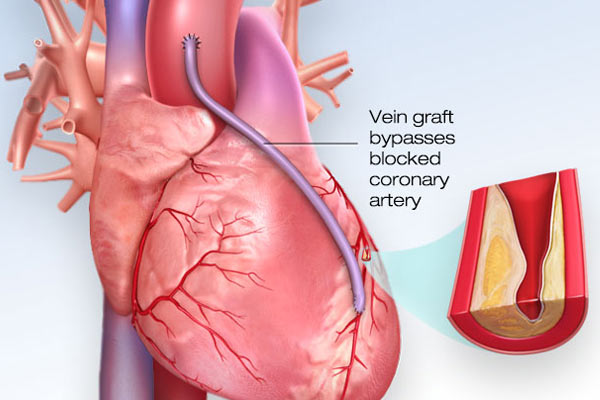
-
by antalyahealth
What is Coronary Bypass?
Bypass surgery is a surgical method to maintain the vitality of the heart that is fed by main artery and the operation aim to repair as a result of narrowing or blockage in a certain area of an artery.
The operation carried out through arterial veins prepared from another part of the body and blocked area of the artery repaired by pass and sufficient amounts of blood is delivered to the area where the artery is blocked.
In what age does Coronary Bypass surgery be performed?
In recent years, the age range of coronary bypass surgeries has expanded considerably in Turkey. Now icluding in a late age, surgeries can be performed safely and scientificly.
What are the risk factors in bypass surgery?
Risk factors vary depending on the preoperative state, age, gender and presence of other associated illnesses. The risk factors are higher in women and in patient groups over 70 years of age. In addition, diabetes, obesity, the occurrence of any other organ disease (such as kidney or lung diseases), having a heart attack or stroke, accompanying heart valve and/or rhythm disorders, are among the most important risk factors of previous heart surgery.
Time scale for Coronary Bypass Surgery
Depending on the form of the surgery performed, the number of bypass operation appropriated,whether there was any other surgical intervention for the heart in the same session whether he had undergone any heart surgery before. For example, bypassed to two or three vessels, the operation can take 2,5-3 hours, while in some cases where the valve needs to be changed this time can be 4-5 hours.
What are the coronary bypass surgery methods?
With the developing technology there are different techniques of application in bypass surgeries today. In the past years these surgeries are carried out by opening the rib cage while today these surgeries can be performed with small incisions (minimally invasive) robot use in appropriate patients (depending on the patient’s degree of the disease).
What sort of anesthesia be applied in coronary bypass surgery?
General anesthesia is usually applied to patients who will have bypass and heart valve surgery. In most patients who need heart surgery, heart failure, pre-existing heart attack, high blood pressure, diabetes, smoking and advanced lung disease and kidney function disorders are observed at a higher rate. Therefore, anesthesia of these patients requires a different approach.The anesthesist will make an assesment a day before the operation.
Where do the veins used bypass get? Must be taken from the patient himself?
Yes, it is surely taken from the patient himself. An external tissue or synthetic vessels have no place in coronary bypass surgery. These surgeries are performed by preparing veins from the leg with the right and left breast arteries, arm arteries.
How long is the duration of hospital stay after bypass surgery?
The duration of hospital stay of a patient in a low risk group after bypass surgery varies between 4-6 days. In our clinic, every patient is called to outpatient control a week after discharge, long-term follow-ups and risk factors (high blood pressure, obesity, cholesterol levels, blood sugar regulation, by organizing the drugs, stress, tobacco use, such as) is directed to the cardiology department to be controlled. The return of patients to normal daily life after bypass varies between 2-4 weeks depending on their preoperative clinical condition.
Bypass breathing exercises after surgery
Immediately after bypass surgeries, the patient is taken to the intensive care unit and his/her vital signs are monitored continuously . Where all the findings show a normal course patient woken up within a few hours . From this moment on, respiratory physiotherapists are exercised at regular breathing exercises.
What sort of life to offer patients after bypass surgery?
The basic philosophy of bypass surgeries is to save the patient from sudden death hazards and heart attacks, to remove the drug-dependent, restricted lifestyle and, as a result, improve the quality of life. Therefore, after the surgery which allow the patient to return to normal life safely the most important issue is the formation and progression of vascular disease. In addition, another important issue is to monitor the course of the disease by conducting a periodic check of the patient.
